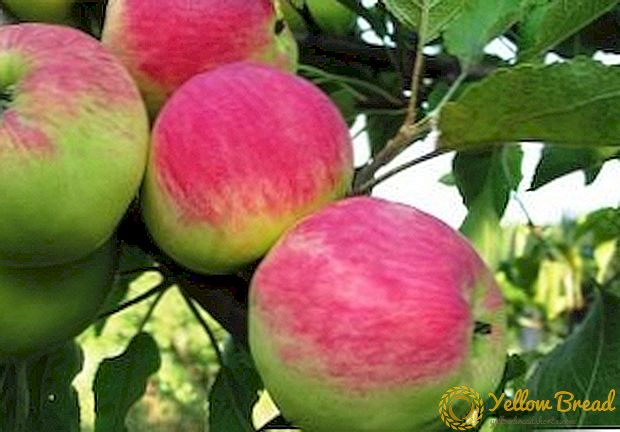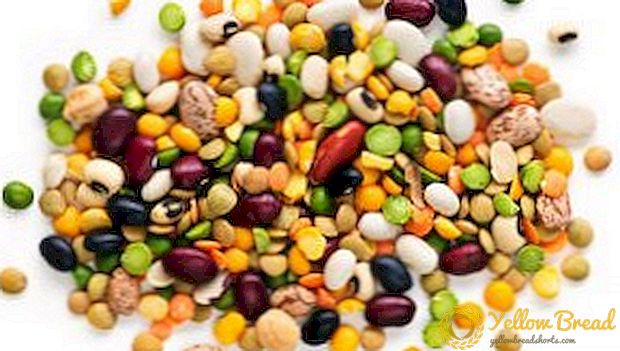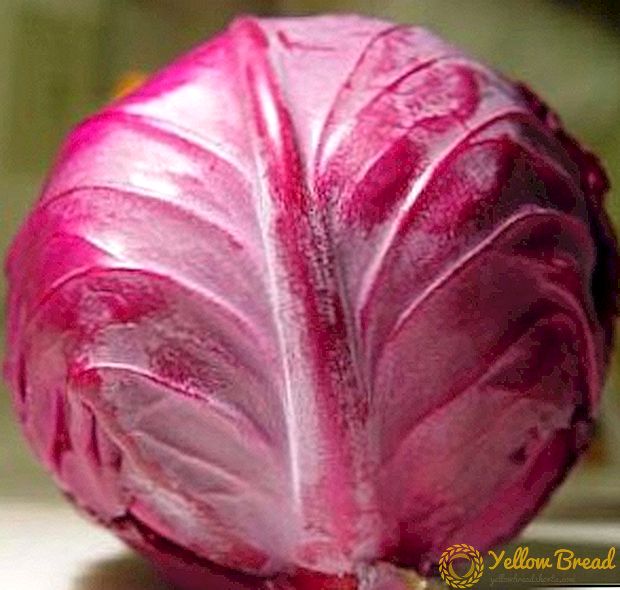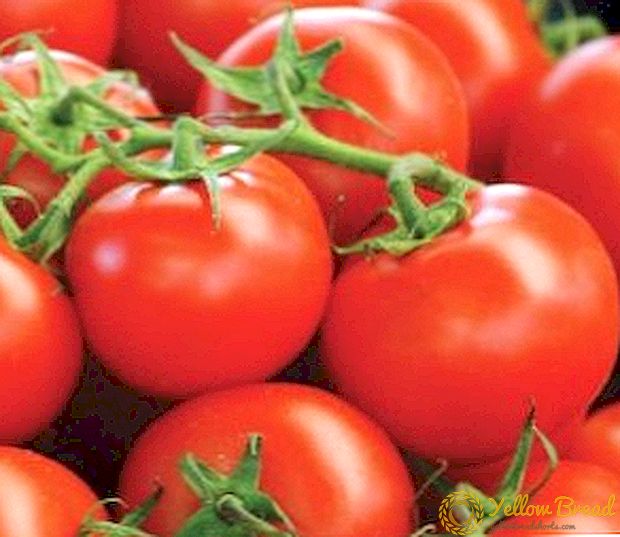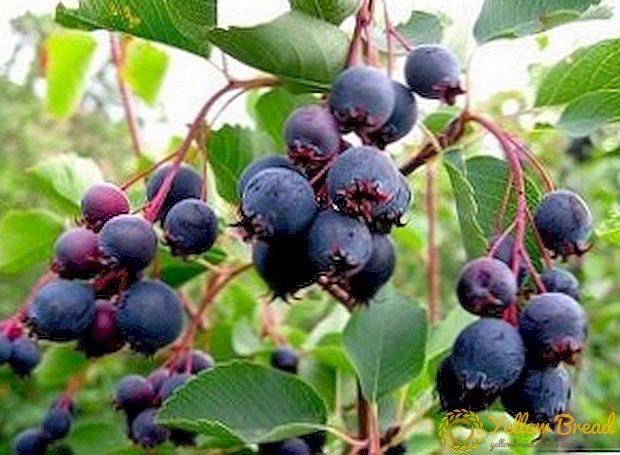 Unconditional favorite, which was fallen in love with many gardeners, is sweet pepper "Swallow", the description and characteristics of the cultivation of which will be discussed further. The fruits of this vegetable are fleshy and large in size, and still quite sweet, which makes it possible to use it not only for harvesting, but also for use in natural form. This variety is valued for its high level of resistance to various diseases, as well as damage by pests.
Unconditional favorite, which was fallen in love with many gardeners, is sweet pepper "Swallow", the description and characteristics of the cultivation of which will be discussed further. The fruits of this vegetable are fleshy and large in size, and still quite sweet, which makes it possible to use it not only for harvesting, but also for use in natural form. This variety is valued for its high level of resistance to various diseases, as well as damage by pests.
Among other things, the cultivation of such peppers does not require special skills and time-consuming from the gardener.
- Appearance and description of the variety
- Characteristics of fruits and their beneficial properties
- The advantages and disadvantages of the variety
- Agrotechnology
- Seed preparation and planting
- All about seedlings
- Transplantation in open ground
- Care, watering, loosening varieties
- How to increase yield
- Harvesting
Appearance and description of the variety
This vegetable crop was developed in Moldova by the method of natural selection. The name of the variety was due to the shape of the fruit, which may resemble the beak of a swallow bird.
Characteristics of fruits and their beneficial properties
The fruits of the considered sweet pepper varieties are characterized by an elongated shape similar to a cone.The length of the pepper can reach about 8-11 cm, weight is usually about 65-100 g. The color of vegetables is either red or light green. As for taste, they are very unique. The fruits are fleshy and sweet, the walls of the pepper are usually about 5-7 mm thick. In general, the variety is versatile and unpretentious in the care, ripen peppers together. The crop that will be harvested from the site can be used without any doubt for preparing summer salads, for stewing and stuffing, and also to harvest fruits for the winter in the form of preservation. Pepper skin is dense enough, which provides an opportunity to carry out long-term transportation without damaging the structure of the fruit and not deforming them. Also, the peel protects vegetables from hypothermia, which allows them to be stored for a long time.
In general, the variety is versatile and unpretentious in the care, ripen peppers together. The crop that will be harvested from the site can be used without any doubt for preparing summer salads, for stewing and stuffing, and also to harvest fruits for the winter in the form of preservation. Pepper skin is dense enough, which provides an opportunity to carry out long-term transportation without damaging the structure of the fruit and not deforming them. Also, the peel protects vegetables from hypothermia, which allows them to be stored for a long time.
Considered a variety of sweet pepper "Swallow" is suitable for growing it in both open and closed ground. Germination of this vegetable is high. Seed material can be bought in the store, or you can collect it yourself.
Vegetables have many beneficial qualities for the human body. Eating them, it is possible to significantly improve the immune system, which will reduce the vulnerability to the defeat of various kinds of respiratory infections.The composition contains vitamins P, B, PP, alkaloid capsaicin, antioxidants and many others. etc. Carotene and ascorbic acid are also available in large quantities. This feature has beneficial effects on the work of the pancreas, and can also regulate blood pressure in the body. By consuming sweet peppers, blood clots can be avoided, and the quality and skin color can be improved. The product is low-calorie, which allows you to include it in the diet of those people who are watching their figure. There are only 27 kcal per 100 g of ripe peppers, if they are red. And in green fruits, caloric content is even lower - only about 19 kcal.
The product is low-calorie, which allows you to include it in the diet of those people who are watching their figure. There are only 27 kcal per 100 g of ripe peppers, if they are red. And in green fruits, caloric content is even lower - only about 19 kcal.
The advantages and disadvantages of the variety
The advantages of sweet pepper "Swallow" a lot. The main can be considered the following:
- Uniform ripening of fruits on the hands of a vegetable plant;
- Excellent transportability and possibility of long storage;
- Resistance to many common diseases;
- Unpretentiousness and unpretentiousness in ordinary care;
- Good tolerance to changes in weather conditions (it can withstand both droughts and a slight drop in temperature);
- Productivity at a high level in almost any conditions.
 But to provide a description of the shortcomings of sweet pepper varieties "Swallow" will be more difficult. It is possible to note only minor features, since this vegetable crop has no serious disadvantages. However, these shortcomings can be easily corrected.
But to provide a description of the shortcomings of sweet pepper varieties "Swallow" will be more difficult. It is possible to note only minor features, since this vegetable crop has no serious disadvantages. However, these shortcomings can be easily corrected.- When plantings are thickened, the fruit yield will be significantly lower than usual;
- Several long peppers that grow on a short stalk may rot due to the fact that they lie on the ground;
- Regularly breeders produce all new varieties, in comparison with which "Swallow" is no longer the most high-yielding crop.
Agrotechnology
In order to achieve a good indicator of the productivity of the Swallow pepper, it is very important to observe the list of prescriptions, since the key to the success of growing any vegetable garden is the proper management of agricultural technology.
It consists mainly of the following:
- Proper preparation of seed for planting;
- Growing seedlings in closed soil or under a film cover (temporary);
- Regular and timely soil moistening;
- Carrying out picking, hardening seedlings, as well as fertilizing fertilizers.

Seed preparation and planting
To grow a high-quality vegetable product and then harvest a rich harvest, it is important to take care of harvesting the seedlings in time. Seeds should be reserved by February. Also do not forget about the soil.
Seed material must be decontaminated and planted at the end of the last winter month. Quite often commercially available seeds are presented on the market, but in order to speed up the process of plant growth, it makes sense to use a number of recommendations.
For example, you can warm the seeds in the microwave for a few seconds, or soak them in a solution of water and vodka (1: 1). Thanks to such simple manipulations, it will be possible to get the first sprouts much faster than usual.After that, you need to wrap the seed in a cloth moistened with water and leave it in this form for a couple of days to swell in a warm place. In this case, be sure to ensure that the napkin always remains wet. As for the soil, it can be bought in a specialized store in advance, even in the fall. There is always sold a substrate, which, due to its nutritional value, is perfect for growing seedlings.
As for the soil, it can be bought in a specialized store in advance, even in the fall. There is always sold a substrate, which, due to its nutritional value, is perfect for growing seedlings.
Landing is recommended in special containers, also for this purpose suitable peat cups. Suppose also the method of sowing in peat tablets, one seed in each, but after the first sprouts appear, you will need to plant each of them in a separate container. Planted seeds prepared in advance in the container, you need to lay them at a distance of 15-20 mm from each other on the ground surface. After that, lightly sprinkle the seeds with soil, pressing them a little. It is necessary to arrange planting so that during the irrigation process the seeds are not washed out.
At the end of the sowing process, the container should be closed with glass or transparent film, and the containers should be installed in a warm place.The film will need to be removed only after the first seedlings appear. At the same time, the container must be rearranged in a well-lit place. 
All about seedlings
Pick a seedling separate containers should be carried out after the plants have 2-3 leaves. This most often occurs in the last days of March, or in early April - the time period depends on the timing of sowing seeds. After picking, the seedlings are placed in a shaded place for 2-3 days so that the latter can adapt to the new environment.
Watering seedlings should be carried out as needed. That is, you need to monitor that the soil does not dry out, but also to prevent excessive waterlogging, since stagnation of water in the tank will lead to plant diseases.
To feed the seedlings of pepper "Swallow" will need in several stages. Best suited for this purpose special complex fertilizers that can be bought in the store.They are designed specifically for feeding seedlings of peppers.  You can also fertilize the soil infusion of wood ash. Purchased product should be used following the instructions, and the ash should be infused in water for several days, taking a tablespoon of ash per 1 liter of water. You can also just pour one teaspoon of wood ash into each cup, then pour the plants with warm water.
You can also fertilize the soil infusion of wood ash. Purchased product should be used following the instructions, and the ash should be infused in water for several days, taking a tablespoon of ash per 1 liter of water. You can also just pour one teaspoon of wood ash into each cup, then pour the plants with warm water.
About 2-3 weeks before the planned transplantation of seedlings to a permanent place of growth, you need to start hardening the plants. To do this, in the warm time of the day to make containers with seedlings to fresh air. First, the period of stay on the street should be about 1-1.5 hours. Then the time interval should be gradually increased so that before planting the seedlings can remain in the fresh air throughout the day, if, of course, there were no sharp drops in air temperature.
Transplantation in open ground
After the seedlings of peppers grow up, it will be possible to transplant vegetables into an open garden bed. This should be done at a time when the likelihood of spring return frost is already excluded.Usually such a procedure is carried out not earlier than June.
The best precursors for sweet pepper will be legumes, carrots and onions. A bed, first of all, needs to be dug over carefully on depth of one spade of a shovel. It is also important to clean the area from weeds and their roots. At the same stage, the soil can be fertilized. 
Landing is as follows:
- It is recommended to arrange the plants on the bed in a checkerboard pattern. This form of landing will make further care of the vegetable crop more comfortable. The plan of planting seedlings in open ground does not differ from the greenhouse - 40x60 cm. A more dense planting is not recommended, as this may adversely affect the yield and the overall health of the vegetable crop.
- In the well for planting you need to pour nutrient soil, to which you must first add the necessary fertilizers (for example, superphosphate, humus, urea). Fertilizers are applied only in the event that fertilizing has not been made in the process of digging the site. Also in each well you need to pour half a bucket of water and immediately install the stakes to which the plants will be tied down.
- Seedlings are installed in the hole and gently covered with earth. It is very important to carefully conduct the process, so as not to damage the fragile seedlings. Plants should be planted at the same level at which they were located in the cup; you do not need to bury them too much.
- At the end of planting, all plants need to be watered and left to adapt for 5-7 days at the site. You can mulch a bed with sawdust, chopped straw or peat crumbs.
Care, watering, loosening varieties
In general, the care of sweet peppers is not very different from the standard care for this kind of vegetables. It is necessary to provide the culture with timely top dressing, to moisten the root soil, and also to clean the bed of weeds.
Watering
Watering pepper "Swallow" is recommended well-settled and warm water. Approximately 7-10 days after the seedlings are planted in the garden, it will be necessary to moisten the basal soil once in 3-5 days. Here you need to monitor the weather conditions and the degree of soil moisture.At the stage of flowering of vegetables, as well as during the period of fruiting, watering should be carried out more often.
Feedings
To increase the number of ovaries on the bushes of the plant, it is recommended to spray them with the means "Ovary". If you need to develop the root system, as well as to increase the green mass of vegetables, then you can use the drug "Epin" or simply add urea plants diluted in water. Growing will help accelerate the overall growth of peppers and increase their fruiting - a drug that can be purchased at a specialty store.
Loosening
It is very important to remove weeds from the garden in time. It is recommended to combine this procedure with loosening the root zone. It is important not to tillage the soil too deeply, so as not to damage the roots, which are close enough to the surface.
Growing "Swallow", it is equally important to monitor the growth of plants, so that the bushes do not outgrow. To do this, pinch the top at the stage when the peppers have reached the desired height. Thus, the bushes will remain compact and will develop lateral rather than upper shoots. In addition, you should remove the lower leaves with stepsons.In the upper part of the bushes, it is recommended to leave only the most powerful and healthy shoots with floral tassels.
How to increase yield
To achieve the highest possible level of productivity of the vegetable in question, it will be useful to use some tips from experienced gardeners:
- Stakes to which plants will later be tied up should be placed in the soil even before the seedlings themselves are planted. In this way, the risk of damage to the roots of the plants can be avoided.
- Despite the fact that, in general, sweet pepper loves moisture, it is recommended to cover the bushes with foil during prolonged rains so that the trunk does not begin to rot. It should be understood that the moisture of the basal soil can bring not only the benefits of pepper "Swallow", but also harm.
- It is recommended that the first flowers that form at the upper fork of the stems be removed.
- The first peppers need to be collected at the stage of technical ripeness, and the rest - only when they are fully ripe.

Harvesting
Harvesting should be careful not to damage the fragile stems of the plant. Fruits can be harvested from the very beginning of the fruiting period and continue to be harvested every week, regardless of their phase of maturity. If the weather is favorable, namely: warm, with occasional, short rains, then during the season 1 square. m of pure pepper plantations can produce about 5-6 kg of juicy fruits.
Based on the information provided, it is impossible not to agree with the fact that it is possible to grow sweet pepper “Swallow” in your garden plot even for a novice summer resident. Planting and caring for such a vegetable crop will not take a lot of time and effort, while a juicy, sweet and rich harvest will be an excellent reward for your efforts.

